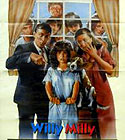|
|
|
|
Willy
Milly
|
 |
|
Popular culture's necessarily confused and ambivalent thinking about radical sex roles – not to mention radical sexual practices – often entails a mystified, symbolic dramatisation. That's why, especially in comic genres, there is so much emphasis on narrative devices like magical identity swapping (Vice Versa, 1988), time travel encounters with one's younger or older self (the Back to the Future series, Coppola's Peggy Sue Got Married [1986]) or cross-dressing for the purpose of disguise (Blake Edwards' Victor/Victoria, 1982). Through such conceits, certain thrilling possibilities can be toyed with for an hour or so – and then, if necessary, shoved right back into the closet at the end. Take for instance the little known comedy Willy Milly (1986), which has also gone under the apt alternative titles of Something Special and I Was a Teenage Boy. It's Yentl (1983) for young teen viewers: one dark night a girl (Pamela Segall), envious of the status of boys at her school, casts a spell on herself and becomes male. Her switch causes ripples of sex and gender confusion in every one of her friends and family. Particular comic anxiety is generated from certain delicate ambiguities of desire: is the crippled boy at school who becomes attracted to the male Milly straight or gay? What does it now mean for Milly to share a bed with her best female buddy, as she has hitherto done? Meanwhile, Milly's parents (Patty Duke is Mom) are made to confront their own stereotypical attitudes to childrearing, as they find themselves (in a hilarious scene) demonstrating to Milly the properties of her new male sexuality via the prop of a shaken-up, exploding coke bottle. The film ends in a conventionally reassuring manner, the world set right again: Milly returns to womanhood, now no longer envious of boys but proud to be a girl. Willy Milly provides the conceptual link between Barbra Streisand's agonised melodramas of gender roles (Yentl and The Prince of Tides [1991]) and the Blake Edwards disturbing identity-switch romp, Switch (1991). MORE Schneider: Empty Cradle MORE gender-reversal comedies:Just One of the Guys, Just One of the Girls © Adrian Martin December 1993 |
![]()